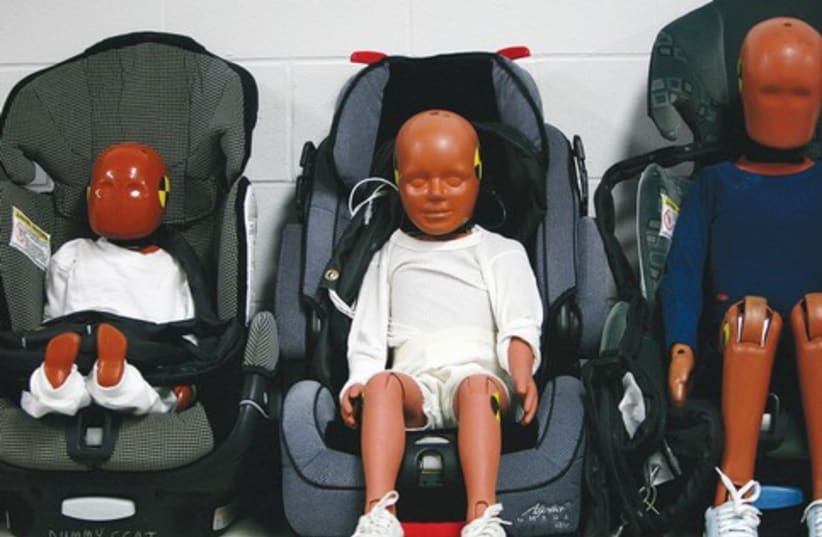Now I read that the American Academy of Pediatrics recently issued new advice based on a University of Virginia study that children should remain facing backward in car seats until the age of two because they are supposedly less likely to suffer severe damage until that age if they are in this position.
I am confused. Have Israeli experts changed their policy guidelines as a result of the American change in advice?– P.T., Tel AvivDrora Navon, public affairs director of Beterem, the National Council for Child Safety and Health, comments: Beterem is well aware of the new advice from the American Academy of Pediatrics and favors informing the public about this new development. However, we will do so only when we are sure that there are proper child car seats that are big enough for this age and suited for facing the rear. In any case, we are acting to encourage importers of safety equipment to bring them to Israel.Our first son is 12 months and 10 days old according to the Gregorian calendar, so we are still new at parenthood. We are religious and celebrate birthdays according to the Hebrew calendar, but because there is an extra Adar, he is not yet a year old. Thus he is considered a year old now. Can we stop giving him baby formula, which has become very expensive in the last few months? Can we stop sterilizing bottles? Can we now give him any food, including all products from cow’s milk, if he likes it, or do we have to introduce new foods very gradually?– N.F., JerusalemProf. David Branski, retiring chief of pediatrics at Hadassah University Medical Center in Jerusalem’s Ein Kerem, replies:The answer is very simple. Your son can have everything, including cow’s milk. There is no more need for feeding him expensive formula and sterilizing bottles. Indeed, it is recommended to introduce new foods gradually.My mother, who is 72, has colon cancer. I have read that the spice curcumin (curcum in Hebrew) has antioxidants that have been shown to fight cancer cells in various organs, including the colon. I read a Hebrew column of Olga Raz, the chief clinical dietitian of the Tel Aviv Sourasky Medical Center, about this beneficial effect. Is it worth trying curcumin – and how much – to help fight colon cancer in additional to conventional oncological therapy?– V.D., Kiryat Shmona
Olga Raz comments: Curcumin has been tested in the lab on cancer cells. The spice has been shown to have preventive and even therapeutic effects on factors connected to malignant tumors in certain organs. Thus some scientists believe it may help fight colon cancer. Today, this is the most studied type of cancer cell regarding curcumin. But the problem is that the amount of the spice absorbed by the digestive system is low, so it’s difficult to know the right dosage. However, since curcumin has been used since ancient times for medical uses, there is no problem using it in food and various additives. However, the patient should consult with her oncologist about using the spice for this purpose in addition to receiving conventional treatment.I am a 66-year-old woman who suffers from various conditions. I have had shingles twice. My dermatologist told me it was the first case he encountered of somebody having it twice. Can you explain this?– J.G., Kiryat OnoProf. Dana Wolf, head of the clinical virology unit at the department of clinical microbiology and infectious diseases at Hadassah University Medical Center in Jerusalem’s Ein Kerem, comments:About 4 percent of shingles patients experience a second episode of herpes zoster (shingles) – so this is not so exceptional. Still, your doctor should do some general clinical investigation to rule out underlying disease that could cause immune suppression.Rx for Readers welcomes queries from readers about medical problems. Experts will answer those we find most interesting. Write Rx for Readers, The Jerusalem Post, POB 81, Jerusalem 91000, fax your question to Judy Siegel-Itzkovich at (02) 538-9527, or e-mail it to jsiegel@jpost.com, giving your initials, age and place of residence.
